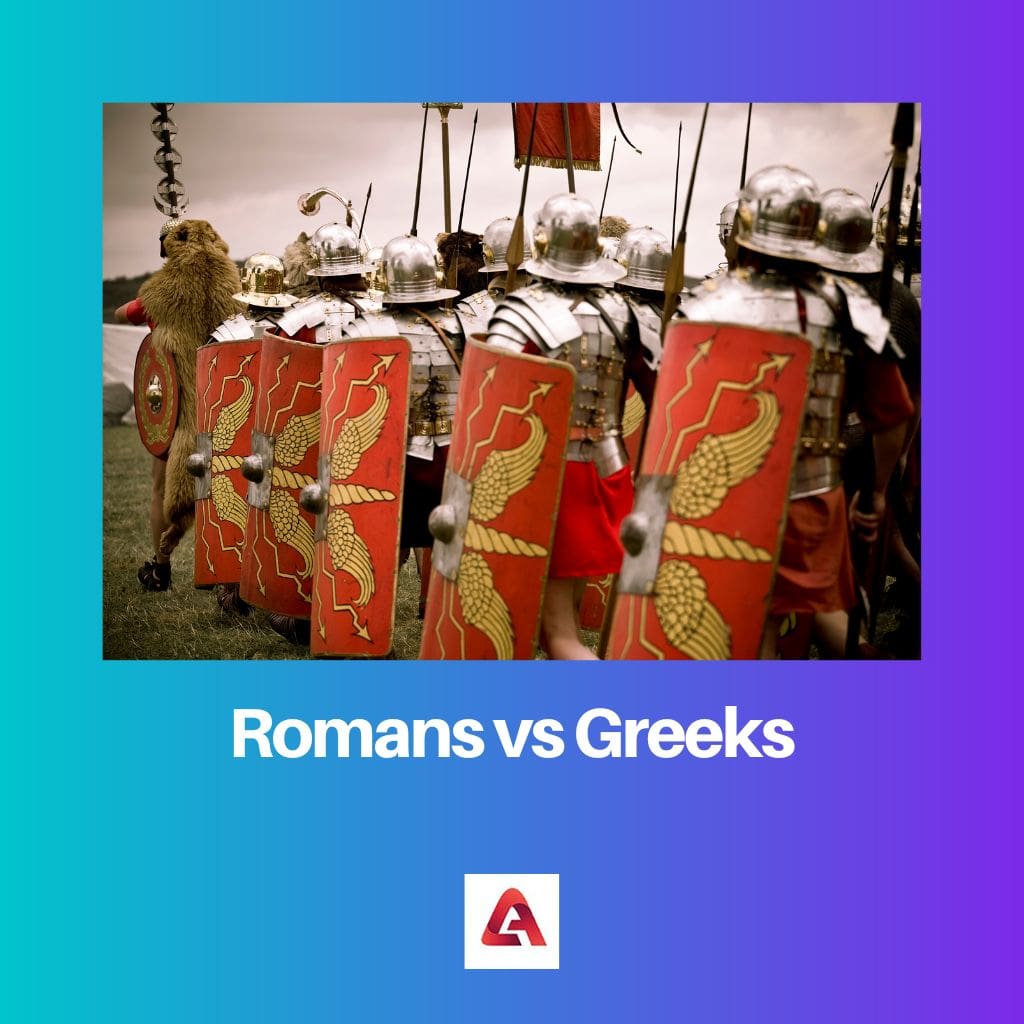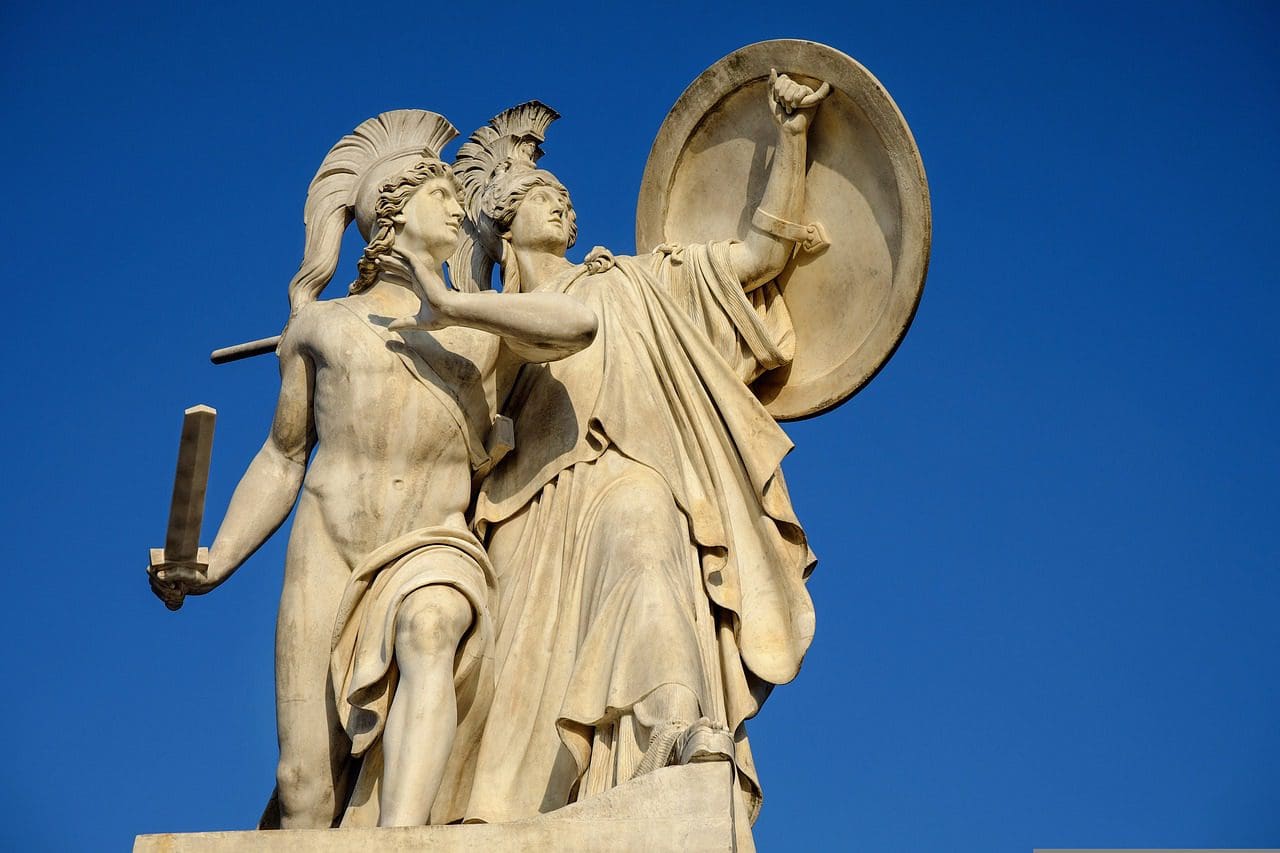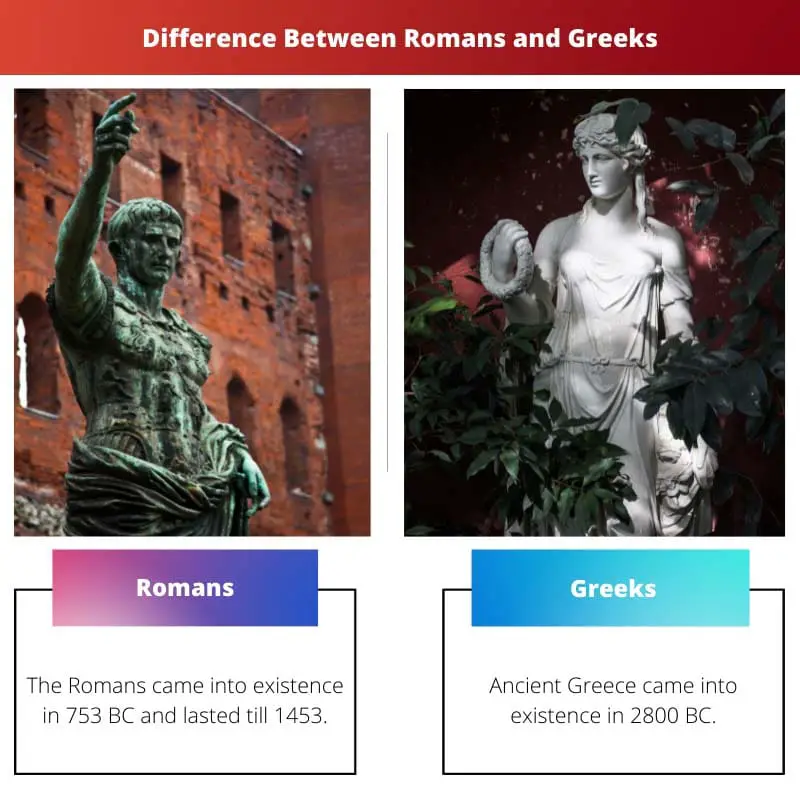The people dwelling in the early civilizations of Rome and Greece were referred to as Romans and Greeks, respectively. Though Rome and Greece are confused with one another, their inhabitants have obvious differences in the timeline, language, architectural abilities, social values, and much more.
Key Takeaways
- Romans and Greeks were ancient civilizations that greatly influenced Western culture, with the Greeks being known for their contributions to philosophy, arts, and sciences.
- The Roman Empire, which succeeded the Greek civilization, is known for its military might, legal system, and architectural innovations like the Roman arch.
- While Greek culture heavily influenced Romans, they developed distinct political and architectural styles.
Romans vs Greeks
The Greeks are known for their contributions to philosophy, mathematics, science, art, and literature. They developed the concept of democracy, made great advances in mathematics and science. The Romans are known for their contributions to law, engineering, architecture, and military strategy.

Meanwhile, the Ancient Roman civilization appeared in 753 BC and lasted till 476 BC, after which the Roman province of Transalpine was created. According to historians, the Western Roman Empire collapsed in 476 AD and the Eastern Roman Empire in 1453, ending the civilizations of Rome.
Comparison Table
| Parameters of Comparison | Romans | Greeks |
|---|---|---|
| Timeline | Thrived from 753 BC to 1453 | Existed from 7000 BC (Neolithic Greece) to 146 BC |
| Art | Imitated the art of Greeks but used a more naturalistic approach portraying physical quirks and nuances in expressions of ordinary people | Sculptures of statesmen and generals were physically idealized, like those of Gods |
| Language | The Romans spoke in Latin. | The language spoken in Greece was Greek. |
| Architecture | Architects focused on actual building design and techniques. Romans used some Greek materials but introduced Concrete. | Architects created statuesque figures in buildings using plaster, wood, marble, and metals. |
| Religion | The Romans imitated the Greek religion but gave the Gods Latin names. (Zeus became Jupiter, Hades became Pluto, Poseidon became Neptune) | The Greeks believed in Pagan gods – Zeus, Hades, Poseidon, etc. |
| Political Setup | Fluctuated between a democratic set-up with a ruler and a Monarchy. | Democracy, as people were independent. |
| Nature of People | Intellectuals are obsessed with ideals of truth, justice, mathematical theorems, epistemology, philosophy, etc. | Thinkers, philosophers, theologians, authors, poets, political ideologists, political thinkers |
| Life After Death | Believed that leading an ideal, model life would make them Gods in the afterlife. | Believed that on death, they would begin a journey to the underworld. |
Who were Romans?
The Romans came into existence in 753 BC and lasted till 1453. In early times, the Romans used Latin as their language, but later on, Greek, Oscan, and Etruscan were spoken in the Roman Empire as well. A lot of information can be deduced based on the artefacts that these people left behind.
The social hierarchy of the Roman Empire had 5 categories – Senators (Political class), Equestrians (Economic class), Commons (Freeborn Roman Citizens), Freed People (Slaves who had bought their freedom), and Slaves (People born or sold into slavery).
Senators and equestrians were considered upper class as rich, while the rest were deemed lower class because of poverty.
Contrary to popular belief, the Romans had a lot of diversity in people and culture. Women were considered citizens if not born into slavery but were not allowed to hold political power or vote.
The Roman Empire was predatory, believing in military-based practices and growth through conquering.

Who were Greeks?
Greek farming societies were established in 7000 BC (Neolithic Greece), while Ancient Greece only existed in 2800 BC. The inhabitants of Greece spoke Greek and believed in Pagan Gods like Zeus, Hera, Poseidon, Hades, etc.
An interesting fact is that the Greeks invented theatres.
The people of Greece were divided and listed under 5 categories – Slaves, Freedmen, Metics (foreigners living in ancient Greece), Citizens, and Women. Females were at the lowest tier of the hierarchy, even below the slaves.
The Greeks lived in mainland Greece and some Greek Islands. Further, down the years, they could even be found in Turkey, Italy, Sicily, North Africa, France, and the shores of the Mediterranean Sea.
Greek civilizations were divided into city-states, each having a tradition, culture, and currency.
The Romans conquered the last city of the Greeks in 146 BC, ending the Greek civilisation. However, people still spoke Greek in small parts of the Roman Empire.

Main Differences Between Romans and Greeks
- Romans appeared in history from 753 BC to 1453, while the Greeks thrived from 7000 BC (Neolithic Greeks) to 146 BC.
- Romans used Latin as their official language, while the people of Greece spoke Greek.
- The Greeks made sculptures of ordinary people whose bodies were idealized like those of Gods. Although Romans imitated the Greeks, their art was far more naturalistic.
- Greeks used sculptures of the human form in their architecture, while Romans focused more on the design and technique of the building.
- Greeks believed in Pagan Gods. Romans imitated the mythological and religious ideologies of the Greeks but translated them into a Roman setup.
- Romans were intellectuals obsessed with concepts such as mathematics and epistemology, while Greeks were thinkers and philosophers.
- Romans believed that leading an ideal life and being a model citizen would make them gods in the afterlife, while Greeks believed that a journey to the underworld begins on death.
- The Romans lived in a political setup that fluctuated between a democracy with a ruler and Monarchy, while the Greeks were independent and believed in a complete democracy.

- https://pdfs.semanticscholar.org/7257/338557bcb493ddad42ebfa066a22e8ad9b57.pdf
- https://books.google.com/books?hl=en&lr=&id=t1IR4WtFjGUC&oi=fnd&pg=PA1&dq=+Romans+and+Greeks&ots=2IzpVwLeBG&sig=T53KgsD6nkagz2IxIfc_cxIhQU4

Despite the informative content, the article takes a somewhat biased perspective, lacking some critical analysis of the mutual influence between these civilizations.
The examination of reciprocal influence between Romans and Greeks deserves a more balanced view and further exploration.
I concur. A more nuanced approach towards the impact these societies had on each other is warranted.
The article is very enlightening and comprehensive in detailing the cultural differences between the Ancient Romans and Greeks. Their architectural, political, and linguistic contrasts are especially intriguing.
I agree, their vast contributions to Western culture and their distinct differences make for fascinating historical study.
The article’s analysis of the nuanced differences between the Romans and Greeks is commendable. A well-structured, informative read.
Indeed, the structured and informative nature of the article adds great value to the reader’s understanding of these ancient civilizations.
The article will no doubt stimulate further discussion and examination of the complexities and nuanced differences between these two pivotal civilizations.
The detailed insights offered in this article are bound to inspire further scholarly discourse on the topic.
Absolutely. It opens the door to deeper explorations and scholarly deliberations on the subject.
While the article addresses key points, it does not delve deeply into some lesser-known aspects of these civilizations. A more comprehensive exploration would enrich the reader’s understanding.
Indeed, there are many more aspects to Greek and Roman civilizations that could have been further elaborated in the article.
The interpretation of the social hierarchy and the differences in the treatment of women in these civilizations is a thought-provoking aspect of this intriguing post.
The presence of detailed analysis into the societal norms of the time period adds depth to the article.
Agreed. The social structures and gender dynamics offer valuable insights into these ancient societies.
While the article provides a wealth of valuable information, there seems to be a slight oversimplification of some complexities inherent in the comparison of these civilizations.
Indeed, a more nuanced approach would add greater depth to the discussion.
I share the sentiment. A more nuanced examination would offer a more comprehensive understanding of the differences and interactions between these cultures.
The rich historical context provided in this article makes it a captivating read. The detailed comparison of the social structures and cultural differences is impressive.
Indeed, the depth of information presented adds great value to this piece.
I wholeheartedly agree. The article is a testament to the author’s in-depth research.
The author’s meticulous dissection of the differences, whether political, linguistic, or cultural, provides a comprehensive understanding of the distinctive attributes of the Romans and Greeks.
Well put. The thorough analysis shines a light on the contrasting aspects of these ancient civilizations.
Absolutely, the article’s thoroughness is commendable and contributes significantly to our understanding of the subject.
The comparison table at the end of the post serves as a convenient reference for a clear understanding of the differences between Romans and Greeks.
I found the table to be a succinct and useful summary of the contrasts between these two ancient societies.